This weekend is the Great British Birdwatch when we note down which varieties of birds are coming to our gardens and making a note of the number of each species we see at any one time. Sparrows and starlings used to be among some of our most common birds, but now they are on the red list, sadly neither put in an appearance in the garden here. After filling the feeders up, we sat back and waited.

Blackbird. We had 7 blackbirds, 3 male and 4 female. This one was trying to chase all the others away.

Coal Tit. They are so quick coming to the feeder, I thought I would never manage to catch one, but I did.
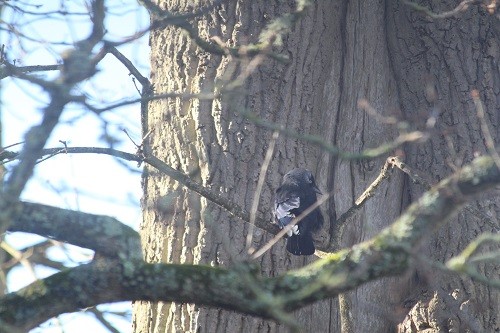
Jackdaws have taken over the hole in an oak that the squirrels used to use. I was surprised to see the paler feathers on the left.
Our number of birds of each species, seen at any one time, in the hour, is as follows –
Coal Tit 1, Greenfinch 2, Goldfinch 5, Blackbird 7, Robin 1, Chaffinch 6, Wood Pigeon 3, Blue Tit 5, Gt. Tit 3, Nuthatch 1, Dunnock 1, Bullfinch 1, Long Tailed Tit 1, Jackdaw 3.
Our Great Spotted Woodpeckers didn’t turn up, too busy drumming on the trees and neither did our little wren which is usually busy searching the wall for spiders and flies. Mr. P. was absent, thank goodness, I don’t want to encourage him into the garden with all the extra food!
But look what turned up yesterday…….
They fly around in flocks, feed madly for a couple of minutes, chattering all the time to each other, and then suddenly, they are gone. I was so lucky to catch them! But why only one today, where are all it’s friends – am I allowed to include them in today’s count do you think?
Are you watching the birds in your garden this weekend?






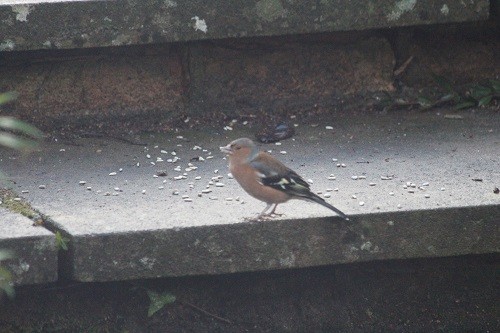




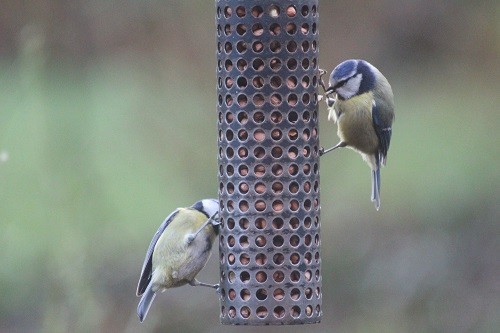


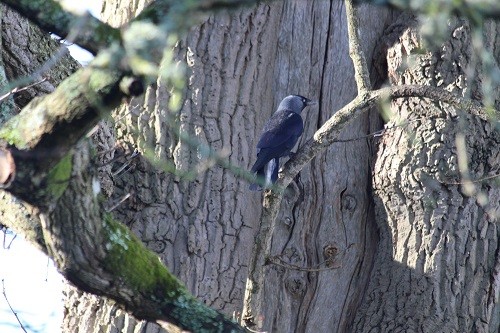

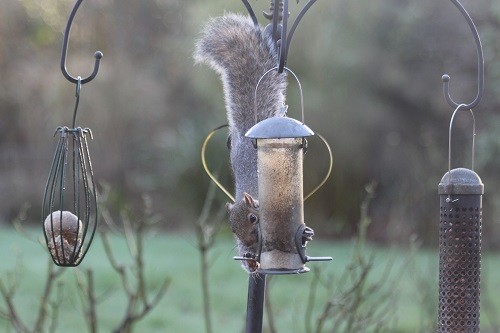


Love your nuthatch !
Thanks Rosemarie, but the Long Tailed Tits are my favourites at the moment, we never know when they are going to turn up, the Nuthatch comes every day for his breakfast!
Great pictures of the birds in your gardens! I love seeing shots of the English robin, so different from our large American one. Your coal tit reminds me of our black-capped Chickadee. Many people participate in a back yard bird count in the U.S., but I don’t recall what weekend it is.
Thanks Alison, the Robins here are so tame, a real gardener’s friend. They follow us round when gardening and pounce on any creepy crawly we disturb. It’s good that we are all keeping a check on our birds, Europe does it this same weekend too.
Your feeder is a busy place, and I love the long tailed tit! I always find it fascinating how different yet similar the birds in your garden are to ours.
I’m sure you know this but on some days our feeder is nearly overrun by house sparrows and starlings. They may be less common by you but rest assured they are doing fine over here.
The Long Tailed Tits are fascinating birds Frank, a small bundle of feathers with such a long tail. Their nest is made out of cobwebs, moss and lichen! It is good to know that sparrows and starlings are thriving in your part of the world. Many years ago, when I was a child, they were our most common birds, they were everywhere, such a shame that there are now so few.
Love the synchronised goldfinches Pauline. We are also counting birds this weekend so I have just filled up the feeder ready. It’s usually very busy, reminiscent of Piccadilly circus!
Yes, so do I Denise, but the amazing thing is that they couldn’t see each other with the seeds in between! Good to know that Europe is counting its birds, I know that feeling when they all arrive at the feeders at once! Hope you have a lovely hour counting your birds
Wonderful photographs Pauline, well done. You have a lot of different birds visiting your feeders, I’m sure they are very grateful for all the food you give them.
Thanks Christina, the missing woodpecker was feeding first thing this morning, why didn’t it come yesterday? I don’t know that they are grateful, they seem to expect the feeders to be filled each day, but we get a lot of pleasure from them and their antics.
Lovely photos.
The nuthatches are a bloody pain to catch on camera here (ditto wrens, long-tailed tits and coal-tits) but I’m afraid that we’ve got the nation’s sparrows. So if you want some spare house sparrows, come to mid-wales and you’ll find plenty. Summertime we also have most of the nation’s bees.
We used to take part in the birdwatch/count but don’t anymore.
I think the RSPB would like to hear about your sparrows Val, as they are on their list of endangered birds. We have plenty of bees here, thank you, in the summer the garden is a-buzzing, but there were some in the woodland yesterday visiting the hellebores, snowdrops and pulmonaria, it makes me think that spring can’t be far away.
The count is so unpredicatable, isn’t it Pauline? For the first half hour or so we had almost no birds at all which is most unusual but we did have some to list after that – like you, the long tail tits kept away for the hour but ours visited soon after we finished counting! It’s always interesting to see what other people get in their gardens – we have never get bullfinches or nuthatches here. Loved your synchronised goldfinches!
Our Great Spotted woodpecker came just after I had sent my list in Cathy! The bullfinches are a mixed blessing, they eat the flower buds on fruit trees and the amelanchier, some years we have plenty of blossom, others hardly any, so frustrating after seeing so many buds. The amazing thing about the goldfinches is that they couldn’t see each other!
What a charming collection. loved them all, especially the gold finches.xxx
Thanks Dina, we love watching them each morning, just like the rush hour!
Such sweet and pretty visitors you had at your feeders! I wonder why starlings are on the red list in G.B. Introduced here in the 19th century, they are now the most numerous songbirds in America and compete with native species. Perhaps you’d like some of ours; we’d happily share.
Thanks Peter, we do have a few pretty ones don’t we! Starling numbers have plummeted over the last 20 yrs or so, the same with sparrows, whereas once they were our most common birds. We now get quite excited if one visits the garden, so yes please, you are welcome to send us some!
Oh what a fine set of feathered visitors Pauline – mind you I imagine that you provide a first class eating establishment for them 🙂 We have a regular gang of long tailed tits which are a delight to watch. We see much fewer finches these days although himself spotted four goldfinches a couple of days ago.
Even though I say it myself Anna, I do provide fine dining for the birds! The long tailed tits are amazing aren’t they, chattering away to each other all the time. We too have far fewer greenfinches than when we moved here 20 odd years ago, but goldfinches are increasing.
Brilliant photos Pauline. I haven’t seen a nuthatch since we moved here, often had them in our Surrey garden, but we do have lots of sparrows. We have flocks of starlings overhead and in the trees but they rarely come into the garden – not that I’m too bothered by that!
Thank you Sue, I dread to think how many photos I took of the feeders, just as the birds flew away! I think the RSPB would like to know that all the sparrows and starlings have come to your part of the world, it’s a great occasion when the odd one turns up here!
Wow I’m so impressed with all the birds that come to your feeder, and the jackdaws moving in would be a real treat for me. We definitely don’t get the variety you get, but I am sitting and looking at “my” flock of house sparrows. We have about 20 in and around the garden, I share them with my neighbour. We do have a red kite that regularly flies over the garden, such a beautiful bird.
The Jackdaws make so much noise once their young have arrived and demand food Helle, at 4 am! I love the variety of birds that we have, as I planted more trees and shrubs, they have more places to hide and build their nests. With having farmers fields on one side and the little woodland on the other, we get birds from both habitats. Since the bird count we have seen one or two sparrows, but that is all, you are lucky to still have so many. Red Kites are beautiful birds, we see 3 or 4 from our sons garden in Windsor each time we visit!